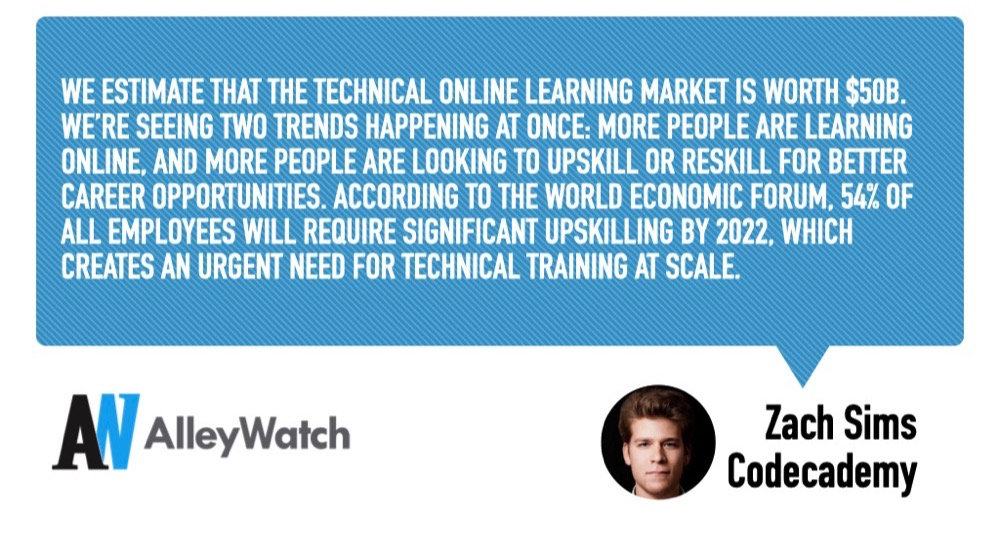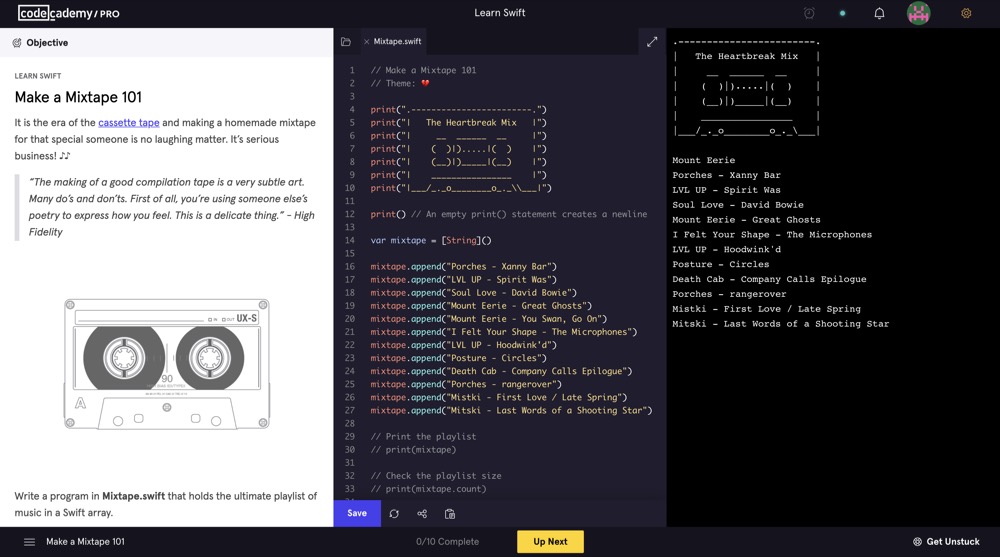Coding has become a new form of literacy in an ever-increasing digital world. Proficiency in coding has significant societal and individual ramifications including the potential to improve educational equality, STEM interest, critical reasoning skills, and building an inclusive workforce. Codecademy is one of the pioneering online coding education platforms, launched in 2011. The company now offers a robust catalog of interactive courses for web development, programming and computer science, and data science that focuses on the most relevant and in-demand skills. The startup has already has helped 50M+ individuals and the model is versatile depending on your preference and level of interest in coding with three main products – the free product, Codecademy Pro ($40) that offers unlimited access to the catalog of courses, and Codecademy for Business, which helps companies upskill their employees.
AlleyWatch caught up with CEO and Cofounder Zach Sims to learn more about the company’s evolution since its founding in 2011, future plans, and latest funding round, which brings the total funding raised to $82M.
Who were your investors and how much did you raise?
Codecademy raised $40M in a Series D round, which was led by Owl Ventures, the largest edtech-focused venture capital firm. Union Square Ventures, who led our Series A, and Prosus, who led our Series C, also participated in the round.
Tell us about the product or service that Codecademy offers.
Codecademy is an interactive, online learning platform that teaches skills across web development, data science, machine learning, and more. Through our hands-on curriculum, we make it engaging, flexible, and accessible for anyone to learn to code and build something meaningful with technology. Since 2011, we’ve helped over 50M learners from 190+ countries unlock in-demand technical skills to improve their careers and livelihoods.
What inspired the start of Codecademy?
When I was an undergraduate at Columbia University, I realized there was a disconnect between what I was learning in the classroom and what I wanted to do in my career. The tech industry was booming, yet traditional education was hardly keeping up. After trying and failing to teach myself how to code, I knew there had to be a better, more accessible way for people to learn the skills they needed to succeed in the 21st century.
In the beginning, Codecademy set out to be the easiest way for people to learn how to code. Today, our vision is even bigger — to connect people to economic opportunities and help them transform their lives by learning modern skills.
How is Codecademy different?
Unlike other online learning platforms, Codecademy is built on interactivity. Our users learn by doing through exercises, quizzes, and real-world projects. We believe interactivity is the most effective way to learn online, especially compared to more passive learning experiences like lectures or videos.
What market does Codecademy target and how big is it?
We estimate that the technical online learning market is worth $50B. We’re seeing two trends happening at once: more people are learning online, and more people are looking to upskill or reskill for better career opportunities. According to the World Economic Forum, 54% of all employees will require significant upskilling by 2022, which creates an urgent need for technical training at scale. By focusing on the most in-demand technical skills and teaching them in an effective, scalable way online, we see a huge opportunity for Codecademy to reach hundreds of millions of learners worldwide and help close the skills gap.
What’s your business model?
Codecademy offers three main products — our free platform, Codecademy Pro, and Codecademy for Business. We originally launched as an entirely free platform, which is still used today by tens of millions of learners every year. In 2016, we introduced our first paid product, Codecademy Pro, which costs $40/month and includes full access to our catalog and interactive features, such as certificates, interview prep, real-world portfolio projects. This year, we reached 150k paid subscribers of Codecademy Pro.
In 2020, Codecademy made the leap into B2B with the launch of Codecademy for Business, which helps organizations train and upskill their employees at work. Codecademy for Business saw 350% growth in its first year, and will be a major area of growth for us following the round.
How has COVID-19 impacted the business?
The biggest impact has happened on a social level — people are recognizing that interactive, online education is effective for learning new skills. Fortunately, Codecademy has been providing high-quality online learning experiences for the past decade, so things weren’t drastically different for us in 2020.
What we did focus on were ways to give back and expand online education to those who needed it most. Last spring, we donated over 200k free memberships to students affected by school closures, as well as workers who had been laid-off or furloughed during the pandemic. We believe education has the power to transform people’s lives, and as a mission-driven company, we were compelled to help.
What we did focus on were ways to give back and expand online education to those who needed it most. Last spring, we donated over 200k free memberships to students affected by school closures, as well as workers who had been laid-off or furloughed during the pandemic. We believe education has the power to transform people’s lives, and as a mission-driven company, we were compelled to help.
What was the funding process like?
Our philosophy has been to raise selectively and with good reason. Fortunately, Codecademy has been cash-flow positive for over two years, and we still have significant money left from our last Series C round in 2016. Given all the growth happening for both the company and industry, we began entertaining the idea of bringing on more capital, though it was important that we remained selective and intentional about how much we’d raise and who we’d work with. After talking to the Owl Ventures team for quite some time, we knew they were the best partners to help us scale and surpass our goals, given their deep experience and expertise in edtech.
What are the biggest challenges that you faced while raising capital?
For us, it was all about finding the right partner. We’ve been incredibly lucky to have a lot of inbound interest from investors, and we actually had the opportunity to raise more money. In the end, we prioritized the quality of our partnership with the Owl Ventures team over a larger number.
What factors about your business led your investors to write the check?
In addition to our company growth — we signed up 5M new learners in 2020 and grew our sales by nearly 2X — our investors recognize how relevant interactive, online technical learning is. This isn’t a fleeting trend that will go away post-pandemic when schools reopen. For nearly 10 years, Codecademy has proved that skills-based, outcome-oriented e-learning is not only effective but necessary for individuals and companies navigating the skills crisis.
What are the milestones you plan to achieve in the next six months?
Over the next six months, we’ll be significantly investing in our products and curriculum, including a larger focus on Codecademy for Business and new subject domains and courses. We are also quickly expanding our international footprint, focusing specifically on our presence in India, which is one of the fastest-growing markets for edtech.
What advice can you offer companies in New York that do not have a fresh injection of capital in the bank?
Prioritize having a healthy, sustainable business model that isn’t reliant on venture capital to survive. Funding is an incredible tool to accelerate growth and expedite your vision, but it shouldn’t be a company’s lifeline. Instead, focus on creating the best possible business model that serves both you and your customers.
Where do you see the company going now over the near term?
Team growth is going to be a huge priority for us, as we won’t be able to accomplish our goals without talented, mission-driven people working with us. We already saw about 2X staff growth in 2020, and anticipate growing at a similar rate in 2021.
What’s your favorite outdoor dining restaurant in NYC
Via Carota in the West Village.







